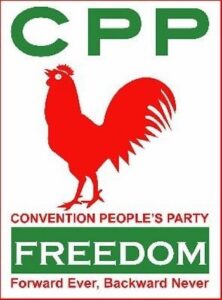
The Convention People's Party logo
*The Convention People's Party (C.P.P.) was formed on this date in 1949. The C.P.P. is a socialist political party in Ghana based on the ideas of Ghana's first President, Kwame Nkrumah.
The Convention People's Party is descended from a line of political movements formed in the early 20th century to spearhead the anti-colonial struggle in the Gold Coast. The movement that preceded it was the United Gold Coast Convention (UGCC), which was led predominantly by members of the professional and business classes. The leadership of the UGCC accepted Ako Adjei's suggestion and agreed to invite Kwame Nkrumah to lead the organization.
Initially, Nkrumah was hesitant about accepting the position. However, after discussing with his colleagues, he decided to accept and was officially introduced to the UGCC's Working Committee as its Secretary on December 28, 1947. Soon, he sought to expand the support base of the UGCC by mobilizing the youth through local youth societies in the Colony and the Ashanti Confederacy, whose members included farmers, traders, drivers, artisans, schoolteachers, clerks, and letter-writers, many of whom were the growing number of elementary school leavers.
In August 1948, the "Committee on Youth Organizations" (C.Y.O.) was formed. J.B. Danquah and his colleagues had become alarmed at the rapidly growing support of their members for Nkrumah and his dynamic leadership. They disapproved of his founding of the C.Y.O., regarding it as a pressure group advancing Nkrumah's determination to speed up the campaign for self-government. On June 11, 1949, the Working Committee of the UGCC issued two resolutions declaring that membership of the C.Y.O. and the UGCC were incompatible and gave notice that Nkrumah was to be "served with charges" for disregarding "the obligations of collective responsibility and party discipline." A day later, on June 12, 1949, before a crowd of some 60,000 people had gathered on the Old Polo Ground, the C.P.P. was born, and Nkrumah resigned as general secretary of the UGCC.
On June 26, 1949, arbitrators examined the dispute between Nkrumah and the UGCC Working Committee, and an emergency conference of the UGCC, youth groups, and the C.P.P. met in Saltpond. But it was too late: the C.P.P. made a clean break. The foundation of the C.P.P. marked a decisive turning point in Ghana's history, as it directly led to the country's independence on March 6, 1957. Resistance to the banning of the C.P.P. began in February 1966. It was a coup when the C.P.P. government was overthrown and all political activity banned. While military regimes were in power for many years, opposition to the ban had to be covert. Later, when political activity was permitted, attempts were made to lift the ban in the C.P.P. Ghana's judiciary openly pursued the matter without success.
Nevertheless, Nkrumaists in Ghana and overseas continued to work tirelessly. It was a campaign destined never to end until victory, when Nkrumaists could once again gather under the banner of the 'C.P.P.,' the historic Party name indelibly imprinted in the minds of many. The Convention Party (C.P.) In 1998, with parliamentary and presidential elections scheduled for December 2000, it was essential to register a party to allow sufficient time to organize an efficient election campaign. If the "C.P.P." could not be registered, the nearest equivalent had to be chosen.
The Convention Party was reborn on August 11, 1998, when it received its final registration certificate from the Electoral Commission. They retained the cockerel symbol of the C.P.P. and its motto: FORWARD EVER, BACKWARD NEVER. Botsio was appointed Interim Chairman of the Party. The impetus for the merger of Nkrumaist forces, which led to the formation of the C.P., originated from the youth. This augured well for the future, as did the C.P.'s clearly stated adoption of Nkrumaism as its political philosophy. The C.P.P. was unbanned before the 2000 elections. However, the C.P.P. was unbanned and has since contested the 2000 and 2004 elections. In the 2008 presidential and parliamentary elections, the party won one parliamentary seat for Kwame Nkrumah's daughter, Samia Nkrumah, in the Jomoro constituency. The presidential candidate, Paa Kwesi Nduom, underperformed, garnering 1.4% of the valid votes. In June 2018, the party was admitted to Socialist International as a consultative member.